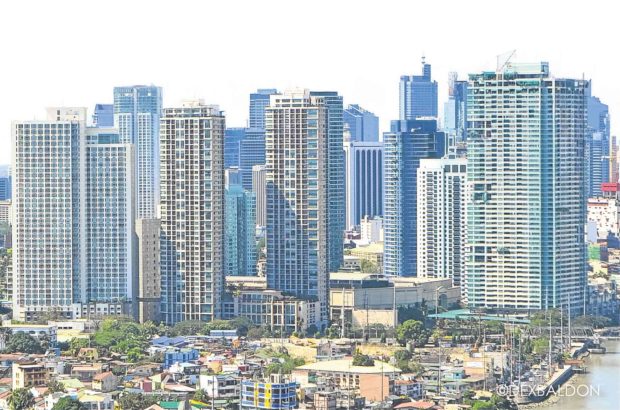Warmer PH-China relations benefit PH property sector

Chinese investors and workers are driving residential demand in the metro along with professionals working in CBDs.
The Philippine residential property sector has started to benefit from the warmer relations between Manila and Beijing, a development that may play a major role in sustaining demand in Metro Manila.
This was according to the latest report by Colliers International Philippines, which pointed out that local developers have benefited from increasing residential demand from Chinese employees and investors.
“Colliers recommends that developers with significant ready-to-occupy units, especially in the fringes of established business hubs, to specifically target the Chinese employees of offshore gaming firms. Condominium projects in the Makati fringe are particularly popular among these employees. Hence, developers with completed projects in the area should zero in on this opportunity,” Colliers said in the residential report it released last month.
Sustaining demand
Colliers pointed out that offshore gaming firms from China continue to occupy office space in the capital.
This trend should sustain not just the office sector but also the Manila condominium market, which provides support to offshore gaming operations in the central business districts (CBDs) and their peripheries. And by this, Colliers meant that Chinese investors and workers employed by offshore gaming companies are driving residential demand in the metro along with foreign and local professionals working in CBDs.
As of end June this year, about 30,000 units have been taken up in the pre-selling sector, and Colliers said it further sees take up breaching the 60,000-mark by yearend.
Declining vacancies
Colliers likewise noted that Metro Manila vacancy declined to 11.3 percent in the second quarter from 12.4 percent in the first three months of the year, as major submarkets such as Makati CBD, Ortigas Center, Manila Bay Area and Rockwell posted lower vacancies.
“Colliers has observed that condominiums in the fringes of Makati have become very popular among Chinese offshore gaming employees,” it said.
“These residential towers are preferred by Chinese nationals due to their proximity to office buildings that house offshore gaming companies. The ground floor retail of the condominiums has also evolved—now housing a mix of Chinese restaurants, convenience stores and international coffee chains,” it reported.
Fort Bonifacio’s vacancy also dropped further to 15.8 percent from 17.3 percent in the first quarter. Over the past few years, Fort Bonifacio has become the preferred location of multinational outsourcing companies, foreign embassies and international schools.
Aside from sustained demand from expatriates, condominium units in the business hub continue to benefit from sustained interest from affluent families looking for residential units to invest in.
Chinese investors are also drawn to the business hub due to its proximity to Manila International Airport and the presence of international schools. The transfer of the Philippine Stock Exchange operations to Fort Bonifacio should also have a positive impact on Fort Bonifacio’s residential towers.
Meanwhile, the Manila Bay Area’s vacancy dropped to 12.9 percent from 14.8 percent in the first quarter as the business district continues to benefit from a strong demand from the Chinese nationals employed by offshore gaming firms in the area.
Local and foreign investors have likewise purchased completed condominium units in this business hub. Some investors reportedly lease their units to Chinese employees or locals working for outsourcing companies, hotels and traditional or non-outsourcing firms operating within the Bay Area.
Rockwell Center’s vacancy in the second quarter dropped to 10.3 percent from 11.3 percent as condominium units here continue to benefit from stable demand from expatriate families.
Demand in provinces
Meanwhile, Colliers further disclosed that strong residential demand from Chinese employees and investors is seen spilling over to the provinces.
“We see the offshore gaming sector’s impact on the residential sector spilling over to areas such as Cebu, Pampanga and Laguna as these firms have started to occupy office space in these key locations,” it said.
“Colliers encourages developers to capture opportunities in these areas by exploring the type of residential component, condominiums or condormitel (condominium units operated as dormitories), which are favourable to this tenant profile,” Colliers further said.
Luxury market
On another development, Colliers International Philippines meanwhile said it expects the luxury condominium demand to remain strong as Metro Manila continues to have one of the most attractive rental yields in the region; relatively low prices; and sustained demand from affluent Filipinos, foreign investors and offshore gambling firms.
Although the luxury market in Metro Manila is relatively small, demand has been stable over the past few years.
“The projects being leased out or sold to the secondary market continue to receive strong demand. This entices affluent locals and foreign investors to look for similar developments in Metro Manila. In fact, the pent-up demand encourages mid-income condominium developers to scale up and construct high-end projects in emerging business districts such as the Manila Bay Area,” Colliers explained.
More affluent locals are reportedly seeing luxury condominium projects as a viable investment option aside from the stock market. The shift in lifestyle also encourages the high-end investors and end-users from posh villages to embrace condominium living.
“We think developers with parcels of land in the Bay Area should consider building residential towers that cater to the upscale and high-end markets. Condominium units that target these markets are those priced at P6 million ($112,000) and up,” Colliers said.
“Colliers believes that the Bay Area is an attractive location for wealthy families from Southern Luzon and cities in Metro Manila that are upgrading to condominium living. The Bay Area is an attractive location due to its proximity to Manila International Airport and ease of access to other business hubs across the country’s capital,” it further explained.














